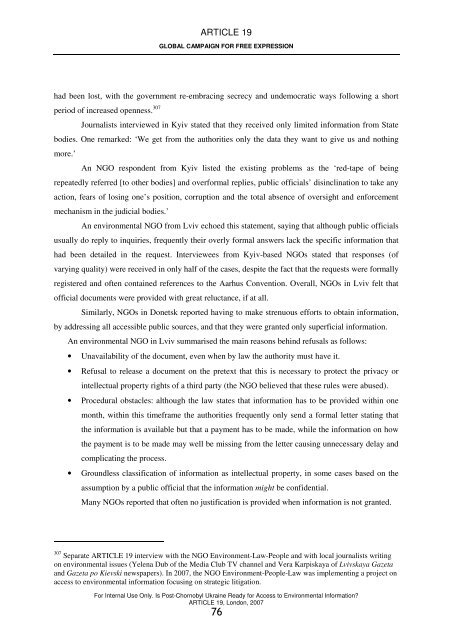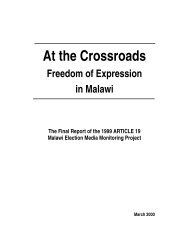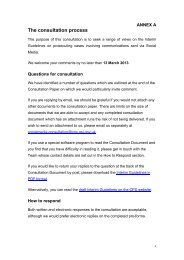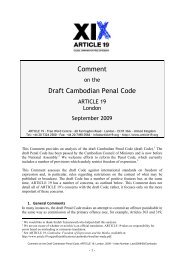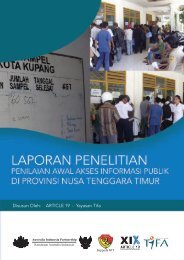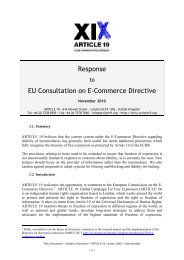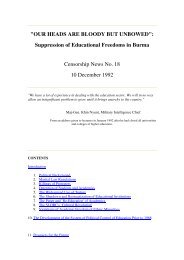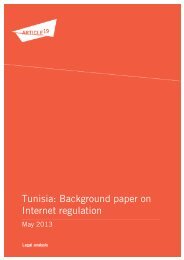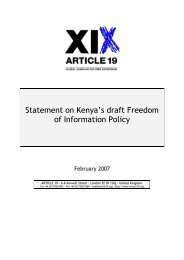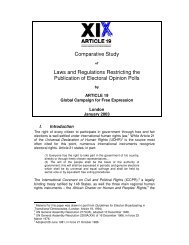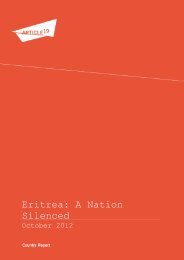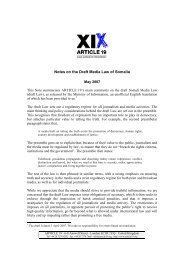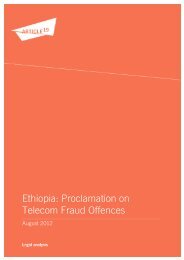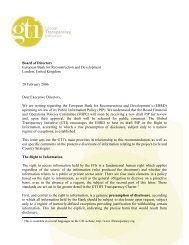FOR INTERNAL USE ONLY - Article 19
FOR INTERNAL USE ONLY - Article 19
FOR INTERNAL USE ONLY - Article 19
- No tags were found...
You also want an ePaper? Increase the reach of your titles
YUMPU automatically turns print PDFs into web optimized ePapers that Google loves.
ARTICLE <strong>19</strong>GLOBAL CAMPAIGN <strong>FOR</strong> FREE EXPRESSIONhad been lost, with the government re-embracing secrecy and undemocratic ways following a shortperiod of increased openness. 307Journalists interviewed in Kyiv stated that they received only limited information from Statebodies. One remarked: ‘We get from the authorities only the data they want to give us and nothingmore.’An NGO respondent from Kyiv listed the existing problems as the ‘red-tape of beingrepeatedly referred [to other bodies] and overformal replies, public officials’ disinclination to take anyaction, fears of losing one’s position, corruption and the total absence of oversight and enforcementmechanism in the judicial bodies.’An environmental NGO from Lviv echoed this statement, saying that although public officialsusually do reply to inquiries, frequently their overly formal answers lack the specific information thathad been detailed in the request. Interviewees from Kyiv-based NGOs stated that responses (ofvarying quality) were received in only half of the cases, despite the fact that the requests were formallyregistered and often contained references to the Aarhus Convention. Overall, NGOs in Lviv felt thatofficial documents were provided with great reluctance, if at all.Similarly, NGOs in Donetsk reported having to make strenuous efforts to obtain information,by addressing all accessible public sources, and that they were granted only superficial information.An environmental NGO in Lviv summarised the main reasons behind refusals as follows:• Unavailability of the document, even when by law the authority must have it.• Refusal to release a document on the pretext that this is necessary to protect the privacy orintellectual property rights of a third party (the NGO believed that these rules were abused).• Procedural obstacles: although the law states that information has to be provided within onemonth, within this timeframe the authorities frequently only send a formal letter stating thatthe information is available but that a payment has to be made, while the information on howthe payment is to be made may well be missing from the letter causing unnecessary delay andcomplicating the process.• Groundless classification of information as intellectual property, in some cases based on theassumption by a public official that the information might be confidential.Many NGOs reported that often no justification is provided when information is not granted.307 Separate ARTICLE <strong>19</strong> interview with the NGO Environment-Law-People and with local journalists writingon environmental issues (Yelena Dub of the Media Club TV channel and Vera Karpiskaya of Lvivskaya Gazetaand Gazeta po Kievski newspapers). In 2007, the NGO Environment-People-Law was implementing a project onaccess to environmental information focusing on strategic litigation.For Internal Use Only. Is Post-Chornobyl Ukraine Ready for Access to Environmental Information?ARTICLE <strong>19</strong>, London, 2007('


